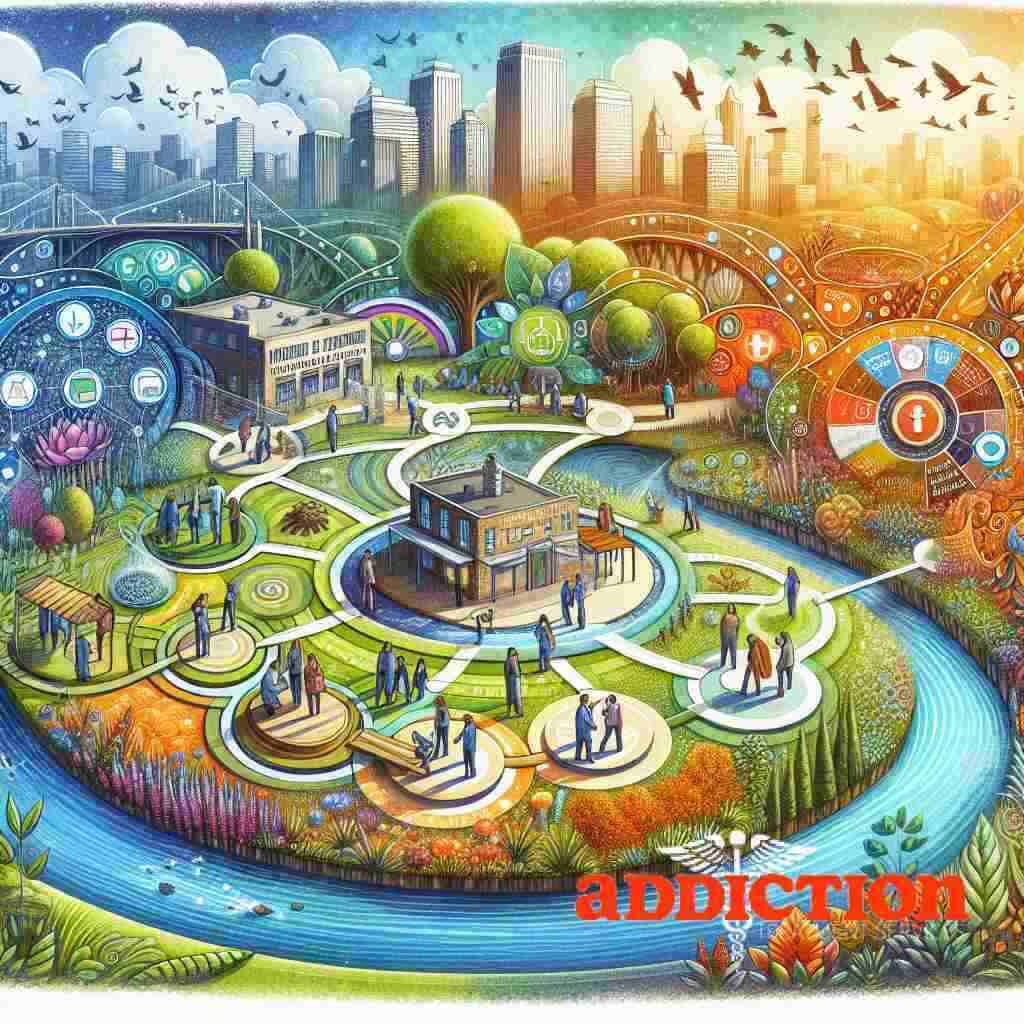 Posted On: 10/24/2025
Posted On: 10/24/2025Introducing the Concept of Integrated Care Models
Evolution of Substance Abuse Treatment in New Jersey
The evolution of substance abuse treatment in New Jersey has been a dynamic journey. Over the years, the state has recognized the complexity of substance misuse and the necessity for comprehensive treatment frameworks. What began as simple detoxification services has transformed into a multifaceted approach, incorporating both behavioral health services and mental health services. As societal understanding of addiction has advanced, so too has the diversity of treatment programs, ranging from outpatient care to intensive outpatient programs. Today, there’s an emphasis on tailoring treatments to the needs of vulnerable groups, acknowledging substance use disorders as unique experiences requiring personalized strategies. New Jersey addiction treatment services now prioritize integrative and patient-centered recovery pathways, ensuring that no individual faces this journey alone.
Defining Integrated Care within Addiction Treatments
Integrated care within addiction treatments represents a confluence of methodologies aimed at providing holistic addiction care. This approach acknowledges that traditional substance abuse treatment methods often fall short, particularly when faced with the complexities of dual diagnosis and co-occurring mental health issues. By focusing on integrated care models in addiction recovery, practitioners aim to align mental health services with addiction therapy. This integration ensures a seamless coordination between treatment facilities, offering comprehensive treatment plans for recovery that extend beyond the immediate confines of detox and therapy. The implementation of coordinated care systems is pivotal, fostering a unified treatment service, addressing both substance abuse and the underlying psychological triggers associated with addiction.
Need for a Holistic Approach: Beyond Traditional Methods
The traditional methods of treating addiction often concentrate solely on the physical aspects, such as withdrawal symptoms and detoxification processes. However, a paradigm shift towards holistic addiction care innovations has emerged, advocating for the integration of physical, emotional, and psychological healing. A holistic approach to substance use disorder management transcends medical intervention, incorporating lifestyle changes, family therapy, and community support as integral elements of the recovery process. Emphasizing mental health and addiction treatment integration fosters a broader perspective, addressing the roots of addiction while promoting sustained mental wellness. This comprehensive viewpoint is not just about treating the symptoms but about empowering individuals through recovery-focused care, paving robust pathways towards lasting sobriety and overall well-being.
Navigating New Jersey’s Pathways to Integrated Care
Unmasking New Jersey’s Unique Substance Use Disorder Challenges
New Jersey faces a myriad of substance use disorder challenges that necessitate innovative and integrative solutions. The state needs to address not only the widespread prevalence of substance misuse but also the societal and economic implications. The opioid epidemic has particularly highlighted the urgency for more robust addiction treatment frameworks. Many individuals struggle with co-existing chronic pain and addiction, complicating treatment approaches. The integration of behavioral health and mental health services is becoming increasingly critical, as is the deployment of comprehensive treatment plans designed to address these complex conditions.
New Jersey’s diverse population brings unique challenges, including cultural differences in perceiving and addressing addiction. Language barriers and socioeconomic disparities further hinder access to effective treatment. As such, addiction recovery pathways and frameworks continue to evolve to better meet the needs of these communities. Addressing these challenges requires a systemic approach and a willingness to innovate beyond conventional treatment modalities, ensuring accessibility and equity for all New Jersey residents.
Collaboration and Co-Management in Statewide Treatment Systems
Collaboration among various sectors and stakeholders is pivotal for advancing coordinated care for substance abuse in New Jersey. Treatment facilities recognize the importance of a cohesive network that encompasses professional medical services, community programs, and government initiatives. This collaboration is crucial in creating streamlined pathways for addiction treatment that are both efficient and comprehensive.
Statewide treatment systems have begun to emphasize co-management strategies, integrating healthcare providers, addiction specialists, and mental health professionals. This ecosystem fosters a shared responsibility in patient care, ensuring consistent monitoring and support throughout the recovery journey. Such integration enables the flow of information and resources across different levels of care, facilitating patient-centered outcomes. Moreover, collaboration enhances early intervention strategies, improving long-term sobriety rates and reducing instances of relapse by fostering systemic care approaches.
Role of Dual Diagnosis in Comprehensive Care
The incorporation of dual diagnosis strategies in New Jersey is a cornerstone of comprehensive addiction care. Many individuals with substance use disorders also battle underlying mental health conditions, necessitating a dual-pronged treatment approach. Dual diagnosis treatment plans aim to treat substance misuse and mental health disorders concurrently, providing a balanced and integrated therapeutic strategy.
In New Jersey, there’s a growing recognition of the importance of simultaneously addressing addiction and mental illness. This approach not only helps in managing withdrawal symptoms more effectively but also mitigates the risk of relapse by treating the root psychological causes. Comprehensive care strategies involve personalized therapy sessions, medication management, and holistic care practices, all tuned to align with the specific needs of individuals facing dual diagnoses.
Treatment facilities are increasingly adopting personalized strategies that focus on the unique requirements of dual diagnosis patients. By understanding the interplay between mental health and addiction, educators and healthcare providers can better craft treatment plans. This results in more sustainable recovery outcomes, helping individuals achieve holistic well-being and self-sufficiency, underscoring the vital role of integrated care models in addiction recovery.

Exploring Innovative Models and Frameworks
Understanding Continuum of Care in Integrated Models
The concept of a continuum of care in New Jersey plays a pivotal role in integrated addiction treatment models. This framework ensures that individuals receive consistent and progressive care throughout their recovery journey. The pathway begins with early intervention and extends through various treatment phases, including detoxification, rehabilitation, and aftercare services. By maintaining continuity, treatment facilities can provide a cohesive and personalized approach, addressing each patient’s evolving needs. This method not only enhances the effectiveness of addiction recovery services but also reduces the risk of relapse by offering ongoing support and monitoring. Comprehensive care plans, grounded in the continuum of care, enable providers to track recovery progress and adjust strategies to maximize patient outcomes.
In New Jersey, integrated care models emphasize seamless transitions between different treatment stages, crucial for maintaining engagement and motivation among patients. By fostering coordinated care systems, healthcare providers can bridge gaps between mental health and addiction care, ensuring that individuals receive holistic support tailored to their unique circumstances. Such comprehensive strategies are indicative of innovative addiction therapy in New Jersey, where interdisciplinary teams collaborate to create dynamic, patient-centered plans that address all facets of a patient’s recovery journey.
Interdisciplinary Teams: Building Blocks of Success
The success of integrated care models in addiction treatment heavily relies on the collaboration of interdisciplinary addiction services. In New Jersey, these teams comprise diverse professionals, including physicians, therapists, social workers, and support staff who work collectively to deliver holistic care. Each member brings unique expertise and insights, fostering a well-rounded approach to treating substance use disorders.
Interdisciplinary teams provide a robust support network that can quickly adapt to the changing needs of patients. This collaborative environment encourages open communication and the sharing of information, essential for timely interventions and effective treatment adjustments. By pooling their skills and knowledge, team members can develop innovative treatment models for addiction that are both comprehensive and personalized. The synergy created within these teams nurtures a more understanding and empathetic treatment environment, crucial for instilling trust and engagement in individuals undergoing recovery.
Healthcare Integration: The Fusion of Mental Health and Addiction Treatment
A cornerstone of modern addiction recovery strategies is the effective mental health and addiction treatment integration. This approach recognizes the intertwined nature of mental health disorders and substance use, advocating for concurrent treatment of both to enhance recovery outcomes. New Jersey’s addiction recovery frameworks increasingly incorporate this fusion, recognizing that treating the mind and body in tandem fosters more effective and long-lasting recovery.
Integrated healthcare solutions in addiction treatment prioritize breaking down the silos that traditionally separate mental health services from addiction therapy. By merging these disciplines, healthcare providers in New Jersey can offer a unified treatment experience that addresses the full spectrum of an individual’s needs. This integration facilitates the development of comprehensive treatment plans for recovery that are adaptable and patient-centered, tailored to accommodate the complexity of co-occurring disorders.
The advancement of addiction therapy in New Jersey is characterized by a commitment to person-centered healthcare practices that empower individuals throughout their recovery process. By fostering environments where mental health care and addiction treatment are seamlessly integrated, patients benefit from a more holistic recovery experience. This synchronization not only improves the effectiveness of treatment but also encourages better engagement, reducing the likelihood of relapse and promoting sustained recovery. By embedding these practices into the broader continuum of care, New Jersey continues to lead in the evolution of innovative addiction treatment strategies.
Implementing Person-Centered and Recovery-Focused Solutions
Patient-Centered Pathways to Recovery
Patient-centered care in addiction treatment is fundamental to achieving meaningful recovery outcomes. These pathways focus on tailoring care to the unique needs of each individual, ensuring that treatment plans are both relevant and effective. Treatment facilities prioritize crafting patient-centered recovery frameworks that empower individuals, enabling them to take an active role in their recovery journey. By incorporating person-centered healthcare approaches, facilities ensure that emotional, psychological, and physical needs are addressed comprehensively. The emphasis is on creating environments that facilitate open communication, fostering trust and collaboration between healthcare providers and patients. This approach not only promotes sustained recovery but also enhances overall well-being, allowing individuals to rebuild their lives on a foundation of personalized care.
Coordinated Care Systems and Their Role in Relapse Prevention
Coordinated care systems play a pivotal role in relapse prevention by ensuring continuous support and monitoring post-treatment. These systems integrate various healthcare providers, offering comprehensive treatment plans for recovery that are adapted to the evolving needs of individuals. By bridging gaps between different treatment stages, coordinated care systems provide a safety net, significantly reducing the risk of relapse. Effective coordination among mental health services, addiction therapy, and community support creates a holistic support network. This interconnected framework fosters early intervention and timely adjustments to treatment strategies, addressing potential setbacks before they escalate. Furthermore, coordinated care enables healthcare professionals to work together collaboratively, enhancing the overall effectiveness of treatment interventions.
Promoting Long-term Wellbeing Through Holistic Addiction Care
Long-term well-being in recovery is achieved through holistic approaches that go beyond traditional treatment methods. Holistic addiction care innovations emphasize integrating lifestyle changes, mental health services, and community support into the recovery process. By addressing the multifaceted nature of addiction, these approaches promote not only sobriety but also overall personal development and resilience. Holistic care solutions focus on healing the mind, body, and spirit, incorporating practices such as mindfulness, nutrition, and physical fitness into treatment plans. These elements are crucial in fostering a balanced lifestyle, contributing to sustainable recovery and improved quality of life. The integration of such comprehensive care models into addiction therapy highlights a commitment to supporting individuals beyond the confines of traditional treatment, encouraging them to thrive in all aspects of their lives. As New Jersey continues to innovate in addiction treatment, the embrace of holistic approaches remains a guiding principle, ensuring robust support for all individuals on their path to recovery.
The Future of Integrated Care: Opportunities and Innovations
The Intersection of Technology and Integrated Care Models
In the realm of addiction treatment, technology holds immense potential for revolutionizing integrated care models. The integration of digital tools such as telemedicine, mobile health applications, and data analytics has paved the way for innovative treatment models that are more accessible and efficient. By harnessing telemedicine, treatment facilities can now offer virtual consultations, enabling patients to access professional guidance from the comfort of their homes. This technological embrace significantly reduces barriers to care, ensuring that individuals in remote locations or with mobility limitations still receive high-quality addiction therapy. Moreover, predictive analytics can track patient progress in real time, allowing for proactive interventions and customized treatment adjustments. Ultimately, technology is reshaping how integrated healthcare solutions in addiction are delivered, fostering more dynamic and responsive care environments.
Expanding Access: Addressing Barriers in New Jersey
Expanding access to addiction treatment in New Jersey involves overcoming a myriad of barriers that hinder timely and effective care. One of the most pressing challenges is ensuring that comprehensive treatment plans for recovery are available across diverse socioeconomic and cultural spectra. Language differences, financial constraints, and geographic limitations contribute to the difficulty in accessing vital services. Efforts to mitigate these barriers include implementing policy changes that incentivize the creation of treatment facilities in underserved areas, thereby improving addiction recovery pathways and frameworks. Additionally, public awareness campaigns play a pivotal role in demystifying addiction treatment services and promoting their availability statewide. By prioritizing both affordability and accessibility, New Jersey can ensure that more individuals have the opportunity to embark on their recovery journey, regardless of their circumstances.
Innovations in Addiction Recovery Frameworks
Emerging innovations in addiction recovery frameworks are setting new standards for sustainable and effective care. New Jersey, in particular, is demonstrating significant strides in adopting innovative treatment models for addiction, characterized by a holistic understanding of patient needs. Integrative practices, such as the incorporation of mindfulness, art therapy, and physical fitness, are redefining traditional approaches. These methods emphasize healing beyond the physical aspects of addiction, nurturing mental, emotional, and spiritual well-being. Collaborative projects that unite interdisciplinary addiction services further enhance the efficacy of treatment by leveraging diverse expertise and resources. This progressive outlook on addiction treatment is crucial for crafting resilient recovery frameworks that adapt to the evolving demands of patients, ensuring they receive comprehensive support throughout their journey. As these innovations continue to evolve, they offer transformative potential for the future of addiction recovery in New Jersey and beyond.

Conclusion: A New Dawn for Addiction Treatment in New Jersey
Summarizing Key Insights on Integrated Care
In recent years, New Jersey has emerged as a pioneer in the development and implementation of integrated care models within the realm of addiction treatment. By recognizing the necessity of a holistic approach to substance use disorder management, treatment centers across the state have adapted to provide a seamless blend of mental health and addiction services, ensuring a comprehensive care framework. This evolution is grounded in the understanding that effective recovery must address not only the physical aspects of addiction but also integrate mental health components, lifestyle changes, and community support. The state’s dedication to interdisciplinary addiction services stands as a testament to its commitment to innovation and excellence in treating substance use disorders.
Future Directions for New Jersey’s Addiction Treatment
As New Jersey continues to build on its strengths, the future of addiction treatment within the state looks promising. There is a palpable shift toward expanding access and removing barriers that have historically hindered individuals from receiving timely care. Efforts are underway to increase the availability of resources across diverse communities, ensuring that comprehensive treatment plans for recovery are within reach for all residents. Advances in technology, such as telemedicine, promise to enhance these treatment frameworks by making them more accessible and adaptable. As the state adopts these modern solutions, the integration of addiction recovery innovations in New Jersey is expected to flourish, leading to more personalized and effective treatment outcomes.
Inspiring Hope Through Innovative Treatment Models
Innovative treatment models for addiction, such as those implemented in New Jersey, are inspiring hope in communities across the nation. By fostering environments that support patient-centered recovery, these models emphasize the strength of collaborative care approaches. The use of multi-disciplinary treatment teams is central to this vision, ensuring that individuals receive comprehensive support across all facets of their recovery journey. As New Jersey paves the way with creative and compassionate treatment strategies, it serves as a beacon of hope and a blueprint for other states to follow. Through continued dedication to excellence and innovation, the state’s addiction recovery pathways and frameworks will undoubtedly play a crucial role in redefining the landscape of addiction treatment in America.
Frequently Asked Questions
Question: How does Addiction Treatment Services support integrated care models in New Jersey?
Answer: Addiction Treatment Services plays a crucial role in supporting integrated care models in New Jersey by providing an extensive directory of local addiction treatment centers that offer comprehensive care. Our platform ensures access to facilities that implement coordinated care systems, aligning mental health and addiction treatment services. We prioritize holistic addiction care, offering personalized guidance and detailed information on available treatment options, such as dual diagnosis programs and interdisciplinary addiction services. By bridging the gap between behavioral health services and substance use disorder management, we facilitate a better understanding of New Jersey addiction treatment, promoting continuity and patient-centered recovery.
Question: What are the benefits of using Addiction Treatment Services for understanding integrated healthcare solutions in New Jersey?
Answer: Using Addiction Treatment Services provides numerous benefits for those seeking to understand integrated healthcare solutions in New Jersey. Our resource-rich platform connects individuals with a variety of addiction treatment centers that employ innovative treatment models. We emphasize the importance of recovery-focused care by ensuring that patients have access to programs that offer comprehensive treatment plans, including intensive outpatient programs and substance abuse treatment tailored to their specific needs. Our commitment to person-centered healthcare helps individuals find the best pathways to sustained well-being, minimizing relapse risks through robust support systems and interdisciplinary collaboration.
Question: How does Addiction Treatment Services ensure accessibility to dual diagnosis treatment in New Jersey?
Answer: At Addiction Treatment Services, we recognize the importance of dual diagnosis treatment in achieving effective addiction recovery in New Jersey. We ensure accessibility by organizing a comprehensive directory of treatment facilities that specialize in integrated healthcare solutions. These centers are equipped to simultaneously address mental health disorders and substance use problems, promoting a balanced and cohesive approach to recovery. By providing detailed information on dual diagnosis New Jersey programs, we help individuals navigate their addiction recovery pathways more effectively, ensuring they receive treatment that is both comprehensive and personalized.
Question: Can Addiction Treatment Services help with understanding the continuum of care in New Jersey’s addiction therapy?
Answer: Yes, Addiction Treatment Services can assist individuals in understanding the continuum of care within New Jersey’s addiction therapy framework. We provide extensive resources and connections to treatment facilities that emphasize this continuous care model, from detoxification services to intensive outpatient programs and beyond. Our focus on integrated care models ensures that each stage of recovery is aligned with the patient’s evolving needs, fostering a seamless transition through the various phases of treatment. By promoting systemic care approaches and recovery-focused care, we empower individuals to achieve long-term sobriety and overall well-being.
Question: What role does Addiction Treatment Services play in promoting innovative addiction treatment models in New Jersey?
Answer: Addiction Treatment Services is at the forefront of promoting innovative addiction treatment models in New Jersey by providing access to cutting-edge programs and resources. We identify and collaborate with treatment facilities that implement progressive and multidimensional recovery frameworks, including interdisciplinary addiction services. By highlighting the benefits of integrated healthcare solutions and innovative treatment models, we ensure that individuals seeking recovery have access to the latest therapeutic interventions. Our mission is to inspire hope and support recovery-focused care, helping individuals navigate their journey with confidence and comprehensive support.


